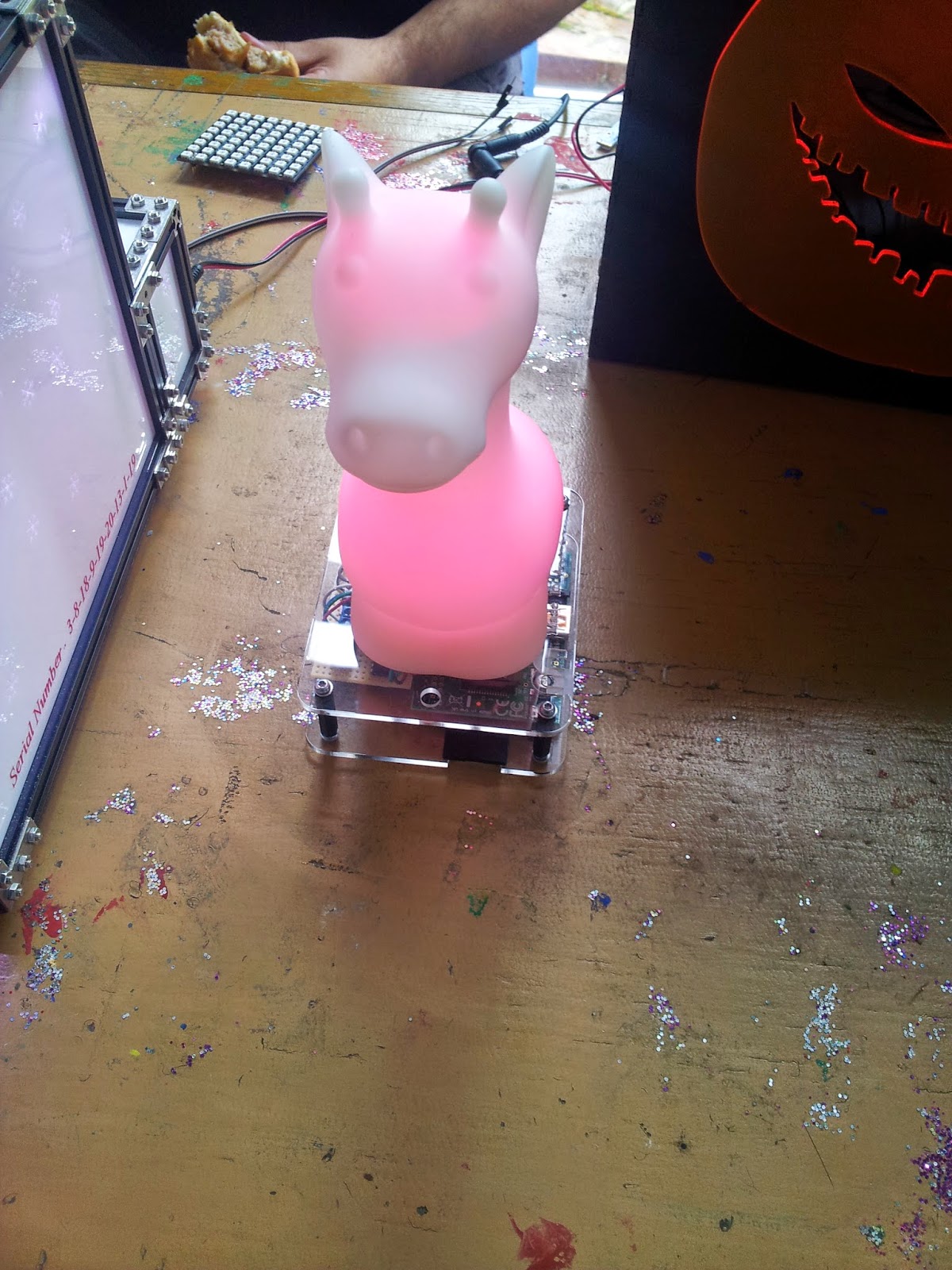On Saturday 5th July I travelled up to Cambridge
to attend my second Raspberry Jam which was held at the Institute of Astronomy.
I was helping out with the Basic Electronics &
Python workshop so when I arrived I was given a “Jam Maker” badge. I had some time to
kill, so I looked around at the Show and Tell stuff which people were starting
to setup up and the Marketplace.
“Jam Maker” (not somebody who makes jam, it’s our name for people who set-up and marshal at the CamJam event)
Brian Corteil had his Naughty or Nice Machine, an Easter Bunny which poo’d chocolate eggs which had been pimped up with some extra lights and an internet connected giraffe mood lamp.
Alex Bienek from Cambridge Robotics Ltd had his robotics project code named Project Claude on display which uses a Raspberry Pi, a custom made add-on board powered by an Xilinx FPGA and a couple of webcam’s.
Paul Brown had his kickstarter funded MyPiFi LED board on display which is a low cost add-on board for the Raspberry Pi. It had has 3 LED’s and push switch on very small PCB.
The Raspberry Pi Club from Stewards Academy had a couple of Pi
related projects on display including PiSketch which is like Etch A Sketch but allows you to draw on a screen, controlled by 2 variable resistors. They also had a Robot arm controlled via glove and
sensor on your arm so when you moved your arm the robot moves pretty cool. The
Tidy Pi was on display, this very neat custom solution for holding your
Raspberry Pi and associated cables. I spoke to David Whale about his simple Arduino
based add-on control board for standard PC’s amongst other things.
Nevil Hunt from innovations in education had the Seven Segments of Pi, PiTrol and PiDapter on display. The PiTrol is a bit like a games controller with several push buttons, 2 LEDs and a mini joystick. The PiDapter allows you to connect two PiTrol’s to a single Raspberry Pi.
Alex Eames from RasPi.tv had his HDMIPi Screen on display. He was also selling some of his RasPiO breakout boards, Port Labels and Duino board.
Carl Monk had a couple of Raspberry Pi projects on display which included Snake and Steady Hands. The Snake game was controlled by a joystick, had a 8 x 8 matrix for the main display and used 2 x seven segment displays for recording the scores. The Steady Hands game used a Pibrella which connected to the wire loop and a RGB LCD for showing the scores.

Priopia had a selection of I/O boards available for the Raspberry Pi
Workshops
The first workshop I helped with was the Basic Electronics
with Python, this was led by Alex Eames. We showed people how to control LED’s,
Buzzers and read switch inputs with Python but as the LED worksheets took up
most of the time we didn’t do much with the switches or buzzers.
After this I had a short break until the next workshop so I
listened to some the talks in the lecture theatre.
After my break I helped out with the Seven Segments of Pi
workshop, this was led by Nevil Hunt. We showed people how to write some Python
code to make a very simple electronic dice using the Seven Segments of Pi.
Finally I helped out with the Python PiCamera with GPIO this
was led by Ben Nuttall. We showed people how to control the PiCamera with a
simple push button circuit and some basic Python code.
Talks
The first talk was given by Alex Bienek who talked about the
development of his Raspberry Pi powered robotics project which was interesting.
Next up Michael Horne talked about PiWars which is coming up
in December, this will be challenge based robotics competition. Michael also
showed off the Camjam Edukit which is a small electronics kit containing a
breadboard, a couple of LED’s, switch and a buzzer.
After this Ben Nuttall talked about how you can contribute to
the Raspberry Pi learning GitHub resource. The Raspberry Pi Foundation use
GitHub for their resources.
Nevil Hunt was up next, he showed us a finished PiTrol game controller and talked about the various functions the controller has.















